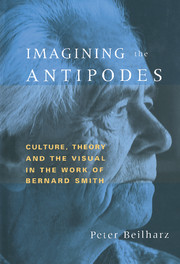Book contents
- Frontmatter
- Contents
- Preface
- Introduction
- Chapter 1 Beginnings
- Chapter 2 Encountering Australian Painting
- Chapter 3 Imaging the Pacific
- Chapter 4 The Antipodean Manifesto
- Chapter 5 Death of the Hero as Artist
- Chapter 6 Modernity, History and Postmodernity
- Chapter 7 Conclusions – Imagining the Antipodes
- Notes
- Index
Introduction
Published online by Cambridge University Press: 22 September 2009
- Frontmatter
- Contents
- Preface
- Introduction
- Chapter 1 Beginnings
- Chapter 2 Encountering Australian Painting
- Chapter 3 Imaging the Pacific
- Chapter 4 The Antipodean Manifesto
- Chapter 5 Death of the Hero as Artist
- Chapter 6 Modernity, History and Postmodernity
- Chapter 7 Conclusions – Imagining the Antipodes
- Notes
- Index
Summary
Who is Bernard Smith? Now eighty, with more than a dozen books to his credit, Bernard Smith is most widely known as an art historian and critic. Others will know a different, related Smith – as anthropologist – this time for his work on the Pacific and the West. These are probably his two most obvious audiences, those who read Australian Painting and those who read European Vision and the South Pacific respectively, and usually in isolation. Other readers will know another Smith; those who work in literature or biography or who work in Australian Studies will likely identify him with his autobiography, The Boy Adeodatus. He has done more, however, than work with words. Others yet again will know him as local activist and educator, teacher and founder of the Power Institute in Sydney, art critic for the Melbourne Age, 1940s Communist, lifelong Marxist. According to Humphrey McQueen, Smith is Australia's greatest living historian; as Smith himself put it, his work is in cultural history with a primary interest in the visual. Yet students of Australian history probably barely consider his work, and social theorists have their heads in other places. Certainly, as you read through reviews and papers Smith's work is credited with being visionary; a copy of European Vision seems to sit on every obvious anthropologist's desk. Most recently, for example, the extraordinary work of Nicholas Thomas takes up its own orientation via Smith.
- Type
- Chapter
- Information
- Imagining the AntipodesCulture, Theory and the Visual in the Work of Bernard Smith, pp. xi - xviPublisher: Cambridge University PressPrint publication year: 1997



